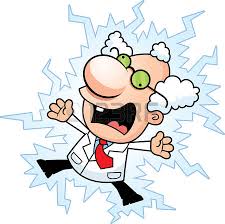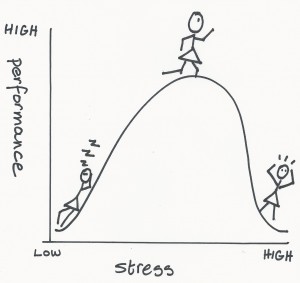I’m sure most of you have had to deal with being able to remember the lyrics to a song you haven’t listened to for five years, but as soon as you have to memorize some flashcards for an exam you’re mind goes blank. Why is that? Why can’t my brain just memorize what I want it to memorize?!
One reason as to why when you are studying you cannot seem to remember anything is because the amount of stress you are feeling. There is actually a principle that was named after two scientists, Yerkes and Dodson, stating just that. The two performed a randomized control trial on a set of mice to see how long it took them to learn to travel down a white pathway as opposed to a black one. The independent variable in this scenario is the intensity of the electric shocks given if they travel down the black pathway, and the dependent variable is the amount of time it takes to avoid the black pathway. The scientists came to see that a stronger shock would cause the mice to move faster away from the passage they were intended to avoid, and a smaller shock would take longer for the mice to learn to avoid it. I think that most people can agree that this scenario would make sense seeing as I would also try to avoid being electrically shocked.
However, as other scientists began to perform meta analysis on Yerkes’ and Dodson’s work, they came to realize that there is more than just the two outcomes of performance. With too little motivation (ex. a test really far away), you have little incentive to act, therefore your performance is also at a low level. As the test moves closer, you have a higher incentive to act, and your performance level is also high because stress has not conquered your ability to study effectively. And lastly, when it is an hour before the exam, you have lots of motivation to study, but your performance is shot because your stress levels are off the charts.
The image above depicts the three separate scenarios. Originally, the hypotheses that had existed explained that arousal and performance were positively correlated, forming a positively sloped line.
The field of arousal and performance does not suffer from the file drawer problem, in fact, there have been many experiments completed and documented. Another example is a study done by Broadhurst in 1957. His population for his randomized control trial was rats as opposed to mice, and his motivation tactic was oxygen level. His experiment concluded a curving correlation between arousal and ability to function as well.
However, scientists are unable to say that there is a direct causal relationship between stress and productivity. Backs, who in 2001 evaluated the signs of a heavy workload by measuring individuals’ heart rates and breathing rates, believes that he found a causal relationship between the two components. However, he explains that many scientists use physical measurements to make causal conclusions about the mental health of a person or population. He warns that the assumption used in this technique should not be trusted because within a relationship that seems obvious, there could be many hidden causes that the scientists are unable to identify, also known as confounding variables.
Overall, it is evident that it is better to start studying early before the exam in order to keep productivity high and stress levels low. Not only will it help you score better, but may be beneficial to your physical health in keeping the levels of your cardiac and respiratory system balanced.
Source: Staal, Mark A. “Stress, Cognition, and Human Performance: A Literature Review and Conceptual Framework.” (n.d.): n. pag. Nasa. Nasa, Aug. 2004. Web. 21 Nov. 2016.








